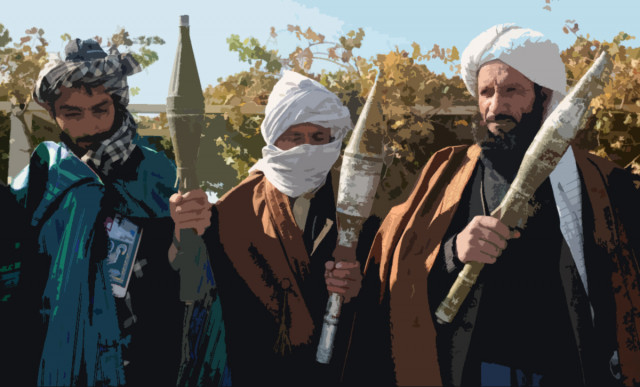Militancy: State needs to eschew all proxies, say security analysts
More accountability and comprehensive policies urged to deal with threats of militancy.

More accountability and comprehensive policies urged to deal with threats of militancy. PHOTO: AFP
Security experts and academics have suggested that the state needs to eschew all its proxies and realise the dangers posed by extremists in the country.
They were speaking at a discussion at Kuch Khaas on Monday on the national security challenges in the aftermath of the March 3 gun-and-suicide attack at the Islamabad district courts complex.
If history is to be believed, they said, the peace dialogue with militants might not work and a military operation might be the ultimate option.
Security analyst, writer and intellectual Ayesha Siddiqa does not believe in the notion that poverty and lack of education are drivers of terrorism. These factors according to her might cause some social divisions, but one of the prime drivers behind militancy might be the state’s own military machine.

The majority of the militant conflict have occurred in the country’s northwestern regions, as she put it, but she feels the future of terrorism could belong in Punjab and Sindh.
Brig (retd) Asad Munir, who made a presentation on the history of the conflict in tribal areas, questioned seriousness of military operation back in 2003. A “very serious operation” was never launched and every subsequent peace deal allowed the militants to regroup and advance.
“The state did not react the way it should have,” he said.
By 2009, the retired officer said, the terrorists including Al-Qaeda and foreign fighters, were ruling over 18 administrative units - 13 in Fata and five in Khyber-Pakhtunkhwa.
Presently, that number has reduced to only one administrative unit, but this reduction was through force, not dialogue, he said.
“Terrorism will not disappear but the ability of terrorists can be diluted if an area is vacated from their control,” Munir said.

Responding to moderator Raza Rumi’s question about the non-regulation of seminaries, Munir said it might be because political governments do not want to create problems for themselves by disturbing religious people.
“Being a religious person is like being a VIP in Pakistan,” Munir said.
Based on past precedent, Munir said the state might have to ultimately rely on a military operation.
He said it will be easier to conduct operation against militants in cities because intelligence agencies had stronger networks in cities and had the added advantage of intercepting communications.
But Siddiqa said she was disturbed by the evident lack of intent in terms of policies to handle militancy.
She said the militant forces in Punjab have, over the years, achieved a sort of “neo-feudal” status where they control and adjudicate and the “legitimisation of their presence from state actors is critical”.
The “Punjabi Taliban” label is a misnomer, Siddiqa said, because unlike the original Taliban, which were a kind of lower-class, revolutionary movement against the problems created by Afghan warlords, the Punjabi militants are middle-class jihadis with outreach and enrichment.
The attacks at the Islamabad district courts indicates that there were not only pockets of extremism in other parts of the country, but also that there were many blanks that need to be filled in understanding the problem, Siddiqa said.
“Absolute clarity is needed in dealing with this,” she said. “Somewhere the state needs to understand very clearly that we have to give up on all proxies.”
Both speakers agreed that there was a need for more accountability and comprehensive policies to deal with the threats of militancy.
Published in The Express Tribune, March 18th, 2014.



















COMMENTS
Comments are moderated and generally will be posted if they are on-topic and not abusive.
For more information, please see our Comments FAQ